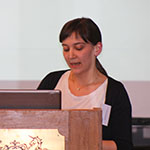Euroacademia Conferences
 Europe Inside-Out: Europe and Europeanness Exposed to Plural Observers (9th Edition) April 24 - 25, 2020
Europe Inside-Out: Europe and Europeanness Exposed to Plural Observers (9th Edition) April 24 - 25, 2020 Identities and Identifications: Politicized Uses of Collective Identities (9th Edition) June 12 - 13, 2020
Identities and Identifications: Politicized Uses of Collective Identities (9th Edition) June 12 - 13, 2020 8th Forum of Critical Studies: Asking Big Questions Again January 24 - 25, 2020
8th Forum of Critical Studies: Asking Big Questions Again January 24 - 25, 2020 Re-Inventing Eastern Europe (7th Edition) December 13 - 14, 2019
Re-Inventing Eastern Europe (7th Edition) December 13 - 14, 2019 The European Union and the Politicization of Europe (8th Edition) October 25 - 26, 2019
The European Union and the Politicization of Europe (8th Edition) October 25 - 26, 2019 Identities and Identifications: Politicized Uses of Collective Identities (8th Edition) June 28 - 29, 2019
Identities and Identifications: Politicized Uses of Collective Identities (8th Edition) June 28 - 29, 2019 The European Union and the Politicization of Europe (7th Edition) January 25 - 26, 2019
The European Union and the Politicization of Europe (7th Edition) January 25 - 26, 2019 7th Forum of Critical Studies: Asking Big Questions Again November 23 - 24, 2018
7th Forum of Critical Studies: Asking Big Questions Again November 23 - 24, 2018 Europe Inside-Out: Europe and Europeanness Exposed to Plural Observers (8th Edition) September 28 - 30, 2018
Europe Inside-Out: Europe and Europeanness Exposed to Plural Observers (8th Edition) September 28 - 30, 2018 Identities and Identifications: Politicized Uses of Collective Identities (7th Edition) June 14 - 15, 2018
Identities and Identifications: Politicized Uses of Collective Identities (7th Edition) June 14 - 15, 2018
I am Georgian, and therefore I am European” – Re-searching the Europeanness of Georgia
-
-

-
Presentation speakers
- Natia Mestvirishvili, The Caucasus Research Resourse Centers, Georgia
- Download presentation
Abstract:
“I’m Georgian, and therefore I am European.” These are the words of late Georgian Prime Minister Zurab Zhvania while speaking in front of the Council of Europe in 1999. During the speech, he expressed Georgia’s EU aspirations and outlined the country’s foreign policy agenda for the next decade. Since the Rose revolution in 2003, Georgia has significantly deepened its ties with the EU. A number of foreign policy achievements such as the European Neighbourhood Policy, the Eastern Partnership and the Black Sea Synergy have demonstrated Georgia’s considerable progress towards the potentiality of future EU membership. However, little is known about the societal changes that have occurred against the background of such formal, inter-elite cooperation. Nationwide public opinion surveys conducted by the Caucasus Research Resource Centers (CRRC) in Georgia in 2009 and 2011 identified the following trends: 1. Public attitudes towards the EU are overwhelmingly positive and most Georgians strongly support EU membership, 2. There is a slight shift from survival values to self-expression values with regard to the relationship between society and state. Compared to 2009, the 2011 survey data shows that Georgians have taken a more active view of citizens’ responsibilities and view government as an “employee” rather than as a “parent”, and 3. Despite their remarkable enthusiasm for the EU, national identity remains more profound for Georgians than a European identity.
-
Related Presentations

















